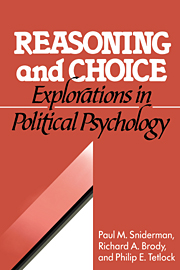Book contents
- Frontmatter
- Contents
- List of tables and figures
- Preface
- 1 Introduction: major themes
- 2 The role of heuristics in political reasoning: a theory sketch
- 3 Values under pressure: AIDS and civil liberties
- 4 The principle–policy puzzle: the paradox of American racial attitudes
- 5 Reasoning chains
- 6 The likability heuristic
- 7 Democratic values and mass publics
- 8 Ideological reasoning
- 9 Information and electoral choice
- 10 Stability and change in party identification: presidential to off-years
- 11 The American dilemma: the role of law as a persuasive symbol
- 12 Ideology and issue persuasibility: dynamics of racial policy attitudes
- 13 The new racism and the American ethos
- 14 Retrospect and prospect
- Notes
- Bibliography
- Subject index
- Author index
Preface
Published online by Cambridge University Press: 05 May 2010
- Frontmatter
- Contents
- List of tables and figures
- Preface
- 1 Introduction: major themes
- 2 The role of heuristics in political reasoning: a theory sketch
- 3 Values under pressure: AIDS and civil liberties
- 4 The principle–policy puzzle: the paradox of American racial attitudes
- 5 Reasoning chains
- 6 The likability heuristic
- 7 Democratic values and mass publics
- 8 Ideological reasoning
- 9 Information and electoral choice
- 10 Stability and change in party identification: presidential to off-years
- 11 The American dilemma: the role of law as a persuasive symbol
- 12 Ideology and issue persuasibility: dynamics of racial policy attitudes
- 13 The new racism and the American ethos
- 14 Retrospect and prospect
- Notes
- Bibliography
- Subject index
- Author index
Summary
At first opportunistically, then programmatically, a growing band of us have worked to develop an account of how people reason about political choices. Though we are acutely aware of the limitations of our approach, we do believe it is on the way to becoming a perspective on public opinion and political psychology. So we have brought together a selection of research papers, both to lay out our general approach and to present some of our specific results.
Most of these studies are being published for the first time, whereas the remainder have been scattered through professional journals. This volume thus provides our colleagues in political science, public opinion, and political psychology their first chance to see and assess what we have been up to, all in all.
Typically, a book in public opinion offers a focused analysis of a specific problem – say, voting – relying either on one set of interviews or on multiple sets using the same questionnaire. Here we have drawn together triply independent studies: concerned with different problems, drawing on separate samples and even sampling frames, assessing different variables or assessing the same variable in different ways. These studies, though, grow out of a common framework, and so far as the results of each confirm the others, confidence in the overall argument should be increased. So far as the results of these studies are mutually confirmatory, although samples, variables, and measures differ, then the overall set of studies should convince even if each study itself is only partly persuasive.
- Type
- Chapter
- Information
- Reasoning and ChoiceExplorations in Political Psychology, pp. xiii - xivPublisher: Cambridge University PressPrint publication year: 1991
- 1
- Cited by



